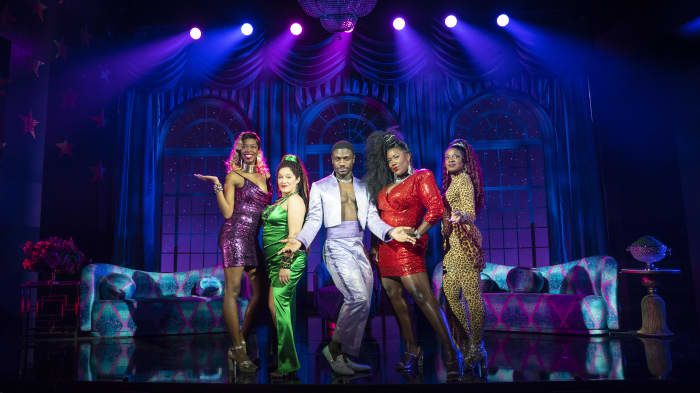When news hit that Jordan E. Cooper’s “Ain’t No Mo’,” a rollicking, edgy play that chronicles the Black experience in America, was closing just a few weeks after its Broadway opening in December, some pretty big names stepped forward to try to save it.
Several prominent Black actors and athletes, including Queen Latifah, Tyler Perry Shonda Rimes, Dwayne Wade, as well as Will and Jada Pinkett Smith, all purchased blocks of tickets as part of a buyout effort to ensure that seats were filled. Cooper also made public pleas to keep the production alive, especially given the positive reviews that it received (Variety called it “a hand grenade of laughing gas.”)
But ultimately, “Ain’t No Mo’” shut its doors on Dec. 23. A couple of days before the closing, Cooper spoke to MarketWatch about his frustration.
“We didn’t have a chance to build what we needed to build,” he said.
The “Ain’t No Mo’” closing followed the abrupt shutdown in December of “KPOP,” a work that celebrated the Korean pop music genre and featured a largely Asian cast and creative team. That has led some to charge that Broadway, the most prominent commercial platform for theater in America, has failed to live up to its promise to diversify and embrace the BIPOC community.

Some of the cast members from “Ain’t No Mo’”
Joan Marcus
All this comes as Broadway continues to recover from more than a year-long pandemic shutdown in 2020-21. The good news is that many shows are now seeing sizable audiences — a revival of “The Music Man” starring Hugh Jackman regularly sells out, for example, with an average ticket price that often tops $ 250.
Still, others such as “Ain’t No Mo’” and “KPOP” are not as fortunate. At the start of its run, “Ain’t No Mo,’” for example, was playing to an audience of less than 70% capacity, despite the fact its average ticket price was $ 21.36 — the lowest on Broadway.
Theater critic Christian Lewis summarized the situation in a Twitter post: “Broadway needs to change, this is unacceptable.”
Cooper said that his show was particularly hurt by the lack of a strong marketing campaign targeting Black audiences — for example, he pointed to how billboards could have been placed in predominantly Black neighborhoods, but weren’t. The result, he said, was that the very people who might have been interested in the play didn’t know about it.
“It was like, ‘Who’s Jordan Cooper and what’s ‘Ain’t No Mo’?’’” he said.
In that regard, another factor that may have affected ticket sales for Cooper’s play: the lack of any well-known actors in the cast. (Cooper himself appeared in the production.) Many Broadway shows these days are propelled by names familiar to audiences from their work in television and film. Cooper pointed to an upcoming revival of Ibsen’s “A Doll’s House” that will star Jessica Chastain as an example.
“People are wanting to spend their money on things they know are a sure bet,” he said.
Ultimately, it’s not the playwright who decides the fate of a Broadway show, but the producer, who’s responsible for raising the money to not only to mount the work, but also to keep it running. Even if plays are cheaper to stage on Broadway than musicals, they still require investments typically in the millions of dollars.
In the case of “Ain’t No Mo,’” the producer was Lee Daniels, who’s known for his work in film and television, with credits ranging from the Oscar-winning “Monster’s Ball” to the Oscar-nominated “Precious.” Daniels couldn’t be reached for comment for this story.
Charlotte St. Martin, president of the Broadway League, the trade group that oversees the industry, said the reality of the situation is that many shows on Broadway don’t find an audience — and that includes both ones that do and don’t have BIPOC themes and predominantly BIPOC casts.
At the same time, St. Martin pointed to several shows this season with BIPOC themes and casts that have run for months, including “Topdop/Underdog,” “Death of a Salesman” and “The Piano Lesson” (the latter production does have a major name — Samuel L. Jackson — in the cast).
“We’ve had some extraordinary BIPOC shows that are doing extremely well,” she said.
Either way, St. Martin said it’s still a challenging time for Broadway in general. While audiences are returning, they industry still hasn’t regained its pre-COVID box-office levels. Making matters more difficult: Producers are having to increase budgets — by 10% to 25%, St. Martin said — to allow for various COVID-related safety protocols.
Cooper said the lesson for him from his experience with “Ain’t No Mo’” is that if he ever returns to Broadway, he needs to take a more active role in promoting his show to the BIPOC market and reaching the audience it needs to find.
“I know how to get the community involved,” Cooper said.
